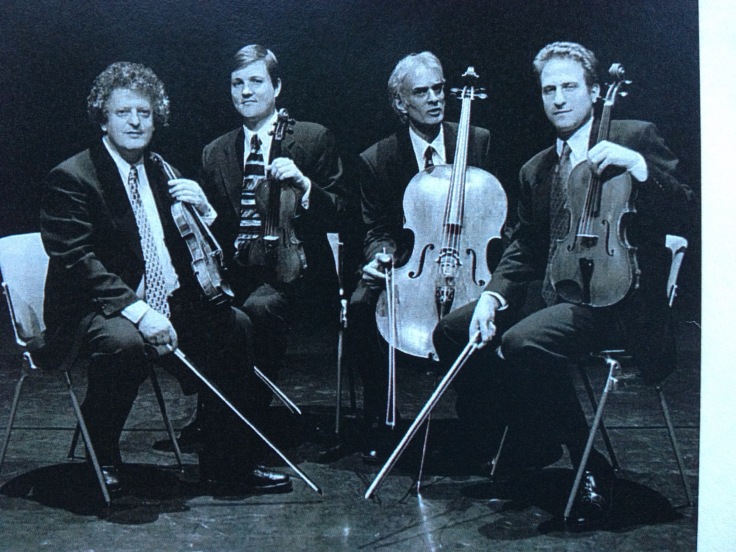Interview with cellist Rohan de Saram
by Fee van Arkel and Saga Oskarson Kindstrand, gy2
Rohan de Saram is a British-born Sri Lankan cellist born in 1939 in Sheffield, Yorkshire. He’s considered one of the greatest cellists of his time, and has won countless awards and played with musicians and conductors like Dmitri Shostakovich, William Steinberg and Pablo Casals. One of the main things he’s famous for is playing in the Arditti Quartet, a string quartet founded in 1974 by the violinist Irvine Arditti.
They first became known for taking very technically challenging pieces into their repertoire. Hundreds of string quartets and other chamber works have been written for the ensemble. Many of these works have left a permanent mark on 20th century repertoire and have given the Arditti Quartet an important role in music history. We got the chance to speak to Rohan de Saram, the cellist who played in the group for thirty years, between 1976 and 2005.
We called him on Skype one afternoon in September. At first, he couldn’t hear us, but his son-in-law helped him find the volume button and the interview could start. He began telling us how he grew up with his three siblings in the capital of Sri Lanka, Colombo. His parents were amateur musicians and wanted their children to learn instruments, but there were no good teachers except for piano teachers. But when Rohan turned eight years old, a well known cellist from Poland came to Colombo. At first, the cellist told Rohan’s parents he didn’t want an amateur as a student –– but two month later, he went to a piano concert where Rohan played, and when he heard him he agreed to take him on as a student.
Two years later, Rohan de Saram’s parents had dropped the idea of him becoming a lawyer and this was when he started travelling the world, auditioning for the greatest musicians and schools. He explained to us how this was a kind of test from his parents to see if he was good enough to become a successful musician, and he proved that he was, getting scholarships from all of the schools. But because of his family’s financial situation, he couldn’t accept the scholarships in the more expensive cities like London or Paris.
In 1955 when de Saram was sixteen, he was granted the Suggia Award (named after Guilhermina Suggia, a very famous, Portuguese cellist) in London and the prize was earning the right to study with Pablo Casals (1876-1973). Casals was a cellist and conductor from Catalonia and is considered one of the greatest cellists of all time. This became de Saram’s big breakthrough, and he now began to play for the New York Philharmonic and the Royal Academy. He also began touring in Australia, Canada, Japan and even in the Soviet Union. He also played in his home country Sri Lanka, but it was hard for his instrument to stay in tune because of the humid climate, he told us.
Twenty years later, de Saram joined the Arditti Quartet and stayed there until 2005 when he retired. Today he is 76 years old, living in London with his wife and son in law, still travelling all over the world giving concerts and practicing everyday. “I can’t practice too much though, or I’ll drive my wife crazy!” he said laughing.

That was the first time he mentioned his wife and he didn’t tell us about his personal life that much. We wondered why, because when we were reading about him afterwards, we found out that his son Suren plays in The Bombay Bicycle Club that has over a million listeners per month on Spotify, and de Saram’s brother plays piano at the Royal Academy of Music.
There are too many questions you want to ask someone like Rohan de Saram, and far too much information to fit into one article. To have the chance to ask questions to such a famous musician was amazing and doesn’t really happen that often. After about forty minutes he told us he was going to go play drums with his son-in-law and had to end the interview, but said he was coming to Sweden next summer and although he’s 76 years old it seemed as though he would keep on playing for another seventy years.

Leave a comment